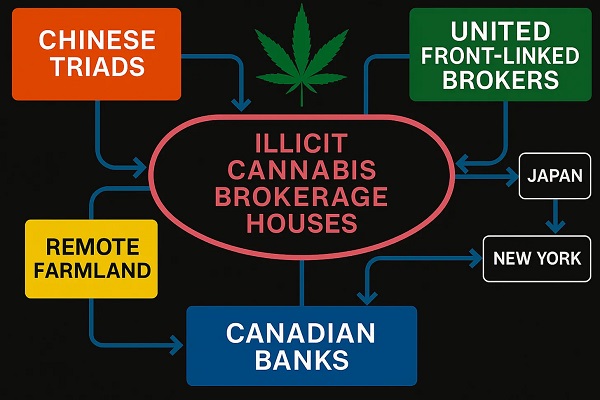Energy
GOP governors announce plan to ‘unleash American energy’
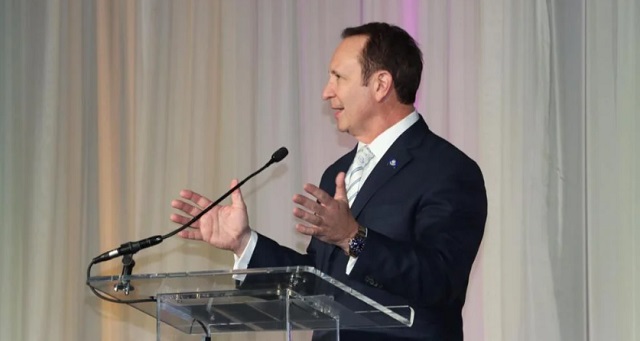
Louisiana Gov. Jeff Landry
From The Center Square
“The reason that inflation is out of control is because of the federal government. If the federal government took its foot off of the neck of American energy, we could absolutely lower the cost of everyday goods.”
Republican governors on Monday announced a plan to “unleash American energy.” They also called on President Joe Biden to protect U.S. energy security after they say his administration has taken more than 200 actions against the oil and natural gas industry.
The governors unveiled their plan in front of a the PBF Energy Chalmette Refinery on the banks of the Mississippi River in St. Bernard Parish, Louisiana, led by Louisiana Gov. Jeff Landry.
“American energy has done more than any other industry to lift more people out of poverty globally than any other industry that I’ve known of,” Landry said.
He said governors know the needs of Americans more than anyone else.
“What we hear from our constituents is that inflation is eating into the pockets of Americans. One of the greatest drivers of that inflation is energy,” Landry said. “The reason that inflation is out of control is because of the federal government. If the federal government took its foot off of the neck of American energy, we could absolutely lower the cost of everyday goods.”
The Louisiana governor listed actions the president took “attacking the industry” from his first day in office, including pausing new oil and gas leases, cancelling the Keystone XL pipeline, prioritizing foreign energy over domestic energy, and releasing agency “rules and regulations at a neck-breaking speed,” that hurt Americans’ pocket books and prioritize “government regulations over free market solutions.”
Joining Landry were governors Mike Dunleavy of Alaska, Brian Kemp of Georgia, Chris Sununu of New Hampshire, Doug Burgum of North Dakota, Kevin Stitt of Oklahoma, and Glenn Youngkin of Virginia.
“Americans are paying 40% more every time they fill up their gas tanks and Republican governors believe one of the best ways to help Americans with all these rising costs is to support an ‘all-of-the-above’ approach to American energy production,” Stitt said, similar to those being implemented in Republican-led states.
“Oklahoma has some of the most affordable reliable energy in the entire country,” he said, because of its “all-of-the-above approach.” Oklahoma is the 6th-largest producer of crude oil and natural gas, the third-largest producer of wind-generated electricity, has among the lowest electricity prices for commercial and industrial consumers, and reduced its electricity generation carbon intensity by 61% over the last two decades, he said.
Stitt cited examples of the president’s “regulatory war on American energy,” including another new EPA emission rule over which 25 attorneys general sued.
“When you’re a governor, you’re working for everybody,” Burgum said, including Republicans, independents and Democrats. “Right now, we’ve got so many Americans that are struggling to put gas in their tank and food on the table.” The governors are “fighting for every American who’s having to pay more than they should,” he said, because of Biden administration policies under the guise of “a big lie that says, ‘if we do all this it’s going to be good for the environment.’”
The U.S. is producing roughly 13 million barrels of oil a day but could be producing “15, 16, 18, 20 million barrels a day,” he said. “That would be not just energy independence, that would be energy dominance. We’d be selling that to our allies instead of our allies having to buy from our enemies,” which is what happened, he said.
The governors are part of a 21-governor coalition who called on the president to pursue “an all-of-the-above energy approach that will promote homegrown energy” instead of pursuing policies that benefit China.
Their solutions include ending regulatory overreach that restricts domestic energy production, including reversing policies on the Dakota Access and Keystone XL pipelines; increasing onshore and offshore lease sales for all forms of energy production, including in the National Petroleum Reserve in Alaska; expediting approval of federal drilling permits; removing the pause on LNG exports; reversing EPA rules; working with Congress to enact comprehensive permitting reform, among others.
Alberta
How Alberta is moving to speed up oil sands reclamation with mine water treatment

From the Canadian Energy Centre
New standards to build on rules already in place for other mining sectors
In what the former Chief of the Fort McKay First Nation calls “a critical step in the right direction,” the Alberta government is moving to accelerate reclamation of more than 1.3 trillion litres of water stored in oil sands tailings ponds.
On Sept. 5, the province announced it will expedite setting standards that allow for “mine water” to be treated and released into the environment, building on the rules that are already in place for other mining operations across Canada.
“We cannot ignore this challenge, we need to keep working together to find practical and effective solutions that protect Indigenous rights, people and the environment,” said Chief Jim Boucher, a member of Alberta’s Oil Sands Mine Water Steering Committee.
That committee is behind a suite of nine recommendations that Alberta is putting into action to improve mine water management and tailings pond reclamation.
The Mining Association of Canada (MAC) says decades of research give the industry confidence that mine water can be safely treated and released once regulations are in place.
But that will take the federal government moving faster too.
Both the federal and provincial governments play a role in potential regulations for the treatment and release of oil sands mine water.
“Alberta is proposing science-based parameters to ensure the safe return of treated water used in oil sands mining, just as other provincial governments do for their respective mining sectors,” MAC CEO Pierre Gratton said in a statement.
“We are hopeful that this will accelerate the development of federal regulations – which we requested almost 15 years ago – to be similarly advanced.”
Gratton said setting standards for safe mine water release could unlock “significant investments” in oil sands reclamation and water treatment.
What are tailings ponds?
Tailings are a byproduct of mining operations around the world.
Oil sands tailings ponds are engineered basins holding a mix of mine water, sand, silt, clay and residual bitumen generated during the extraction process. There are eight operating oil sands mines with tailings ponds in northern Alberta.
Recycling water held in these basins helps operators reduce the amount of fresh water withdrawn from the Athabasca River.
In 2023, 79 per cent of the water used for oil sands mining was recycled, according to the Alberta Energy Regulator.
What is oil sands mine water?
Oil sands mine water is water that comes into contact with the various stages of oil sands mining operations, including bitumen extraction and processing.
Tailings ponds in the oil sands also hold water from significant amounts of rain and snow collected in the decades since the first mines began operating.
While the oil sands mining sector has reduced the amount of fresh water it uses per barrel of oil produced by nearly one-third since 2013, the total volume of mine water in tailings storage has grown as production has increased.
What’s in oil sands mine water?
The constituents of oil sands mine water requiring treatment for safe release are both typical of water in other industrial processes and unique to the oil sands sector.
MAC says common materials are suspended solids like sand, silt and clay, as well as a range of metals. These can be treated by a wide range of proven technologies already in use in Canada and globally.
Unique to oil sands mine water are organic compounds such as naphthenic acids. According to MAC, operators have demonstrated and continue to invest in processes to treat these to levels safe for environmental release.
How does mine water impact reclamation?
At the end of an oil sands mine’s life, operators must remove all infrastructure and restore the land to features of a self-sustaining boreal forest similar to what was there before.
Addressing the challenge of tailings ponds and the mine water stored in them is critical to the overall success of oil sands mining reclamation.
Why is mine water release important?
MAC says the only way to remove mine water in tailings ponds is to treat it for safe release to the environment.
Strict regulations allow for this process across Canadian copper, nickel, gold, iron ore, and diamond mining operations. But it is prohibited in the oil sands.
The safe release of treated oil sands mine water into the environment can reduce the need to store it, minimize further land disturbance and help reclamation happen faster.
MAC says operators have shown they can treat mine water to safe release levels, using processes that include innovative technologies developed through Canada’s Oil Sands Innovation Alliance.
What is Alberta doing?
Alberta has accepted the Oil Sands Mine Water Steering Committee’s nine recommendations aimed at speeding up solutions for safe mine water release.
The province says the recommendations, developed with input from industry, technology providers, Indigenous communities and scientists, will now be evaluated to determine how they can be put into practice.
Business
Energy leaders send this letter urging Prime Minister Mark Carney to unlock Canada’s resources
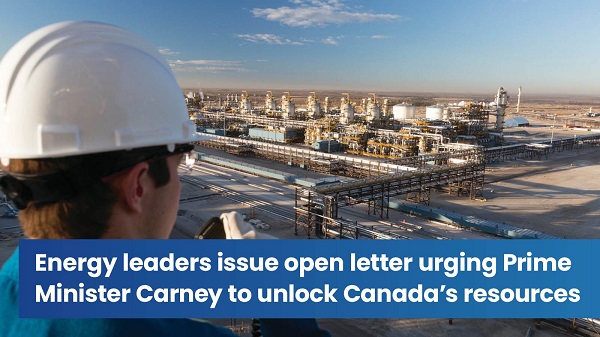
An Open Letter to the Prime Minister of Canada
The CEOs of Canada’s largest energy companies, including Canadian Natural Resources, Cenovus, Suncor, Imperial Oil and many more, have issued a new “Build Canada Now” letter to Prime Minister Carney. They are calling for Ottawa to repeal the production cap, scrap the tanker ban, simplify regulations and shorten project approvals so Alberta’s energy sector can create jobs, attract investment and help Canada become a true global energy superpower.
September 15, 2025
The Rt. Hon. Mark Carney, PC, MP
Prime Minister of Canada
Dear Prime Minister Carney,
Six months have passed since the first “Build Canada Now” letter was sent to you and the leaders of Canada’s other political parties outlining an action plan to unlock Canada’s world class oil and natural gas resources to strengthen Canada’s economic sovereignty, resilience and prosperity. After the election, we followed up with a second letter expressing our support for our shared vision of Canada becoming an energy superpower, one that harnesses both conventional and clean energy resources. Since then, we have seen progress but it is insufficient to stimulate the investment and growth required to make this vision a reality.
Thank you for leading the positive change in tone from the Federal Government in terms of the importance of economic development, including expanded investments in conventional energy. The launch of the new Major Projects Office, Indigenous Advisory Council, the initial list of projects of national significance, and the announcement that it will begin work in support of Pathways Plus are critical steps in the right direction. We appreciate the progress the Federal Government has made in these areas.
However, Canada still lacks the clear, competitive and durable fiscal and regulatory policies required to achieve the so-called “Grand Bargain”. That bargain being significant emissions reductions, expanded market access and material upstream production growth. Achieving these three inter-related outcomes goes beyond progressing select major projects but rather includes a multitude of other projects and related investments. Consequently, we reiterate our call to work together to make the policy changes required for this to happen.
Our call to action is urgent, with persistent indicators that the Canadian economy is moving in the wrong direction. The need to improve productivity and create jobs requires swift and decisive action. Canada is blessed with an enviable abundance of oil and natural gas resources and has the expertise to develop them in a manner consistent with environmental responsibility, social values, and working with Indigenous groups for the benefit of Canada and Canadians. As leaders of this sector, we have consistently advocated for the changes required to unwind the past decade of increasing policy complexity and uncertainty that led to delayed investments, lost opportunities and a competitive disadvantage on the global energy stage.
Given your background, you understand that the private sector and public markets require clarity and certainty to make the long-term investments necessary to realizing this sector’s potential, in turn creating thousands of high-paying jobs and significantly strengthening Canada’s economy.
Making the changes expressed in the earlier Build Canada Now letters are necessary to send clear signals that Canada is open for business. To reiterate, we believe that your government must focus on the following:
- Significantly simplify regulations. The Federal Impact Assessment Act and West Coast tanker ban are impeding development and need to be overhauled and repealed, respectively. Existing processes are complex, unpredictable, subjective, and excessively long. Processes need to be clarified and simplified, and decisions must withstand judicial review.
- Shorten timelines for project approvals. The Federal Government needs to dramatically reduce regulatory timelines to approve all projects within months, not years, of application. This is required to restore investor confidence and once again attract capital to Canada. Clarity on provincial versus federal jurisdiction related to project approvals is also required and needs to be respected.
- Commit to grow production, not limit it. The Federal Government’s unlegislated cap on emissions must be eliminated to allow the sector to grow and achieve its potential for the benefit of Canada and Canadians. The “production cap” creates uncertainty, is redundant, will result in production cuts, and stifles investment.
- Fiscal framework that attracts investment. The Federal carbon levy on large emitters is not globally cost competitive and should be repealed allowing provinces to set regulations. The Federal Government can lead cooperation across jurisdictions, protecting domestic and international competitiveness. Industry needs clear, competitive, and durable fiscal frameworks, including associated with carbon and overall taxation, to secure capital and incentivize investment.
- Incent Indigenous investment opportunities. The Federal Government needs to provide Indigenous loan guarantees at scale so industry can create ownership opportunities to increase prosperity and ensure Indigenous communities benefit from resource development.
As you have clearly stated, our country needs to move from “uncertainty to prosperity”. There needs to be tangible change to make this happen, and without clear and urgent action we risk missing a generational opportunity to capture the potential before Canada now.
As Parliament resumes for the Fall sitting, the energy industry remains committed to working with you, your cabinet, and the provinces on an urgent basis to achieve the energy sector’s potential for the good of Canada. Together, Canada can become the global energy superpower we all envision. We look forward to your response.
Sincerely,
Original signatories

Brandon Anderson
President & CEO
NorthRiver Midstream Inc

Doug Bartole
President & CEO
InPlay Oil Corp.

Robert Broen
President & CEO
Athabasca Oil Corporation

Scott Burrows
President and Chief Executive Officer
Pembina Pipeline Corp.

Chris Carlsen
President & COO
Birchcliff Energy Ltd.

Brad W. Corson
Chairman, President and Chief Executive Officer
Imperial Oil Ltd.

N. Murray Edwards
Executive Chairman
Canadian Natural Resources Limited

Darlene Gates
President and Chief Executive Officer
MEG Energy Corp.

Paul Hawksworth
President and Chief Executive Officer
Inter Pipeline Ltd.

Tyson Huska
President & CEO
Longshore Resources Ltd.

Mike Lawford
President & CEO
NuVista Energy Ltd.

Chris Mazerolle
President
Chevron Canada Resources

Nicholas McKenna
President
ConocoPhillips Canada

Paul Myers
President
Pacific Canbriam Energy Limited

François Poirier
President and Chief Executive Officer
TC Energy Corp.

Susan Riddell Rose
President & CEO
Rubellite Energy Corp.

Don Simmons
President & CEO
Hemisphere Energy Corporation

Adam Waterous
Executive Chairman, Board of Directors
Strathcona Resources Ltd.

Richard Wyman
President
Chance Oil and Gas Limited

Terry Anderson
President and Chief Executive Officer
ARC Resources Ltd.

Michael Binnion
President & CEO
Questerre Energy Corporation

Craig Bryksa
President and Chief Executive Officer
Veren Inc.

David J. Burton
President & CEO
Lycos Energy Inc.

Paul Colborne
President & CEO
Surge Energy Inc.

Greg Ebel
President and Chief Executive Officer
Enbridge Inc.

Grant Fagerheim
President and Chief Executive Officer
Whitecap Resources Inc.

Bryan Gould
Founder & CEO
Aspenleaf Energy Limited

Philip B. Hodge
President & CEO
Pine Cliff Energy Ltd.

Rich Kruger
President and Chief Executive Officer
Suncor Energy Inc.

Byron Lutes
President
Mancal Energy Inc.

Brendan McCracken
President & CEO
Ovintiv Canada ULC

Jon McKenzie
President and Chief Executive Officer
Cenovus Energy Inc.

Curtis Philippon
President & CEO
Gibson Energy

Mike Rose
President and Chief Executive Officer
Tourmaline Oil Corp.

Brian Schmidt
President & CEO
Tamarack Valley Energy Ltd.

David Spyker
President & CEO
Freehold Royalties Ltd.

Bevin Wirzba
President and Chief Executive Officer
South Bow Corp.

Vern Yu
President & Chief Executive Officer
AltaGas
Additional signatories



-

 Business2 days ago
Business2 days agoHow the feds blew your money this week
-

 Opinion1 day ago
Opinion1 day agoIt’s payback time as culture war cops switch sides, moral confusion reigns and revenge gets ready to rumble
-

 Health2 days ago
Health2 days agoNearly 200,000 Albertans left an emergency room without treatment last year, finds the MEI
-

 Business22 hours ago
Business22 hours agoCanadian gov’t spending on DEI programs exceeds $1 billion since 2016
-

 Frontier Centre for Public Policy22 hours ago
Frontier Centre for Public Policy22 hours agoCharlie Kirk Fought A Progressive Ideology That Punishes Truth
-

 Crime21 hours ago
Crime21 hours agoCharlie Kirk’s Widow Says She Forgives Her Husband’s Assassin During Memorial
-
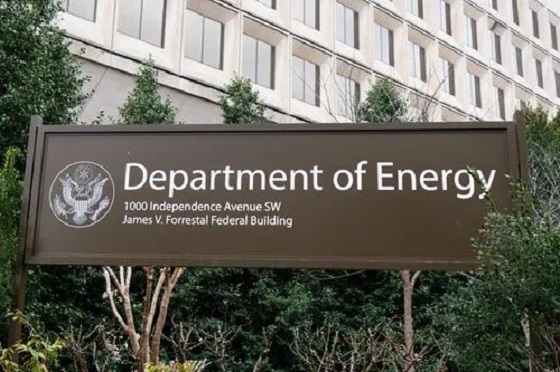
 Censorship Industrial Complex21 hours ago
Censorship Industrial Complex21 hours agoMedia’s Psyop Against Climate Scientists
-
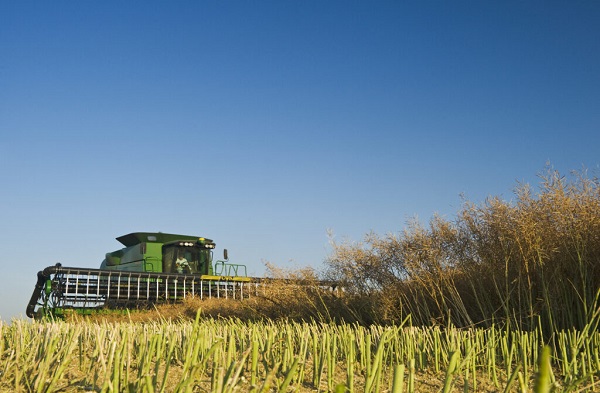
 Agriculture1 day ago
Agriculture1 day agoOttawa’s EV Gamble Just Cost Canola Farmers Billions




